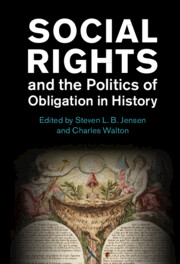Book contents
- Social Rights and the Politics of Obligation in History
- Human Rights in History
- Social Rights and the Politics of Obligation in History
- Copyright page
- Contents
- Contributors
- Acknowledgements
- 1 Not ‘Second-Generation Rights’
- Part I Religion, Markets, States
- 2 The Rights of the Poor
- 3 Public Welfare and the Natural Order
- 4 Who Pays?
- 5 The Haitian Revolution and Socio-economic Rights
- 6 Of Rights and Regulation
- 7 Socio-economic Rights before the Welfare State
- Part II Race, Gender, Class
- Part III Social Rights in the Age of Internationalism
- Index
7 - Socio-economic Rights before the Welfare State
Labour Movements and Economic Emancipation in Nineteenth-Century Europe
from Part I - Religion, Markets, States
Published online by Cambridge University Press: 11 January 2022
- Social Rights and the Politics of Obligation in History
- Human Rights in History
- Social Rights and the Politics of Obligation in History
- Copyright page
- Contents
- Contributors
- Acknowledgements
- 1 Not ‘Second-Generation Rights’
- Part I Religion, Markets, States
- 2 The Rights of the Poor
- 3 Public Welfare and the Natural Order
- 4 Who Pays?
- 5 The Haitian Revolution and Socio-economic Rights
- 6 Of Rights and Regulation
- 7 Socio-economic Rights before the Welfare State
- Part II Race, Gender, Class
- Part III Social Rights in the Age of Internationalism
- Index
Summary
Although we are accustomed to think about the role of the state and international regulations in promoting socio-economic rights all over the world, there were alternative ways of thinking among the working-class movements before the twentieth century. The language of rights, justice and emancipation was central in many workers’ claims and struggles from the end of the eighteenth century, but they saw themselves as fighting for autonomy and emancipation rather than demanding state protection or capitalist integration. The debate over the primacy of political and civil rights, on the one hand, and socio-economic rights, on the other, provoked deep divisions among the socialist and anarchist movements up until the First World War. Looking at European and US workers’ debates and experiences during the nineteenth century, this chapter puts the issue of socio-economic rights (how they were conceived, fought for and contested) at the centre of a renewed intellectual and social history of labour movements. It pays close attention to the international dimensions of economic emancipation, as well as to the colonial, racial and gender limits of these socialist theories of rights and duties.
Keywords
- Type
- Chapter
- Information
- Social Rights and the Politics of Obligation in History , pp. 121 - 138Publisher: Cambridge University PressPrint publication year: 2022
- 1
- Cited by

